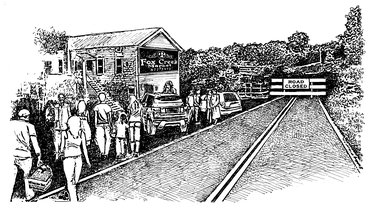Shop where it counts: Bridge the gap for the Fox Creek Market
Commerce can help to meld a community.
Last year, we wrote about general stores failing in the Hilltowns. Being close to urban and suburban centers, many who live in the Helderbergs shop off the Hill.
They hear the Siren song of big-box stores with lower prices — and then the small, local stores crash on the rocks. Knox no longer has a general store and Medusa’s — after a brief and brilliant rebirth — has closed, too.
With rural populations flat or declining, Rocco Ferraro, executive director of the Capital District Regional Planning Commission, told us rural businesses are challenged. The Hilltowns each have populations projected by the commission to increase by fewer than 200 people by 2050.
Cities and suburbs are growing, with a younger generation favoring urban living. After 60 years of decline, regional cities’ populations saw increases in the last federal census in 2010, Ferraro said.
People aged 62 and older make up 18 percent of the population in Berne, according to its 2010 demographic profile from the United States Census Bureau. By contrast, the numbers for 20- to 29-year-olds in the Hilltowns are lower than those in Guilderland and the neighboring city of Albany.
After the Berne store was closed in March 2014, Ray and Tammy Weiler decided to take up the reins and keep it going. They opened on June 1, 2014 and were making a go of it.
“We did it for the community,” said Ray Weiler who lives in Knox. Weiler described the old men who “shoot the breeze” as they sit at the store’s table, enjoying their morning coffee.
Located in the hamlet of Berne, the store is a short walk from the school and kids frequently came after class and before sports practice or play rehearsals to get a snack, said Weiler. “If their name was in The Enterprise, we’d give them a free slice of pizza or can of soda. They loved it.”
The Weilers’ sons — aged 21 and 23 — help out in the store, as does their 18-year-old daughter; the Weilers also have an 8-year-old. “Everyone compliments their work ethic,” said their proud father.
The Weilers’ Fox Creek Market stands next to the stream of that name, with a pocket park behind it. That location may prove to be its downfall. On June 30, state roadwork closed the bridge carrying Route 443 over the creek. The roadwork is expected to last over the summer.
Last July was the store’s best month of business, said Weiler. This July, the store is hurting. The market had been breaking even with about 125 customers a day, said Weiler. Now there are just 25.
“The store was full of inventory,” said Weiler. “When we lost those customers, food expired and we had to throw it away.”
We stood at the edge of the creek and looked across the gaping divide to the market. It was tantalizingly close but a six-mile detour away.
We believe the bridge repairs are needed. We also believe the state is doing what it can to mitigate the loss for the store. The project engineer, Tracey Lawson, saw that an electric sign was put up, letting motorists know the store is open, Weiler said. And, when the state’s Department of Transportation became aware, through our reporting, that motorists were still having problems, spokesman Bryan Viggiani said more signs would be posted.
He explained that, while local residents could take Rock Road, since they knew of it, that route isn’t posted because the DOT doesn’t want big trucks on a rural road.
The Weilers raised concerns this week about large road-construction equipment blocking their entrance and filling their parking lot, making it difficult for customers and vendors alike to get to the store.
“Some vehicles have to be as close to the bridge as possible,” said Viggiani this week. He also told us, though, that space in the town park will be made available for some of the equipment so as to free up space in the Fox Creek Market’s lot.
The Weilers had heard that other stores hurt by road reconstruction had been reimbursed by the state; Viggiani said that no such program exists.
“It’s devastating,” said Ray Weiler. “We tried helping the community. We felt so bad the store closed. There was no place for the kids to hang out or for the old timers to talk....What am I supposed to do? Take out a second mortgage? We lost $10,000 in one month so we’re really scared. ”
Weiler said on Monday that they may have to close the store, at least for the summer. “My wife don’t want to do it,” he said. “There are still people coming in. Some of them are old and can’t get food without the deliveries. ‘Where are they going to go?’ she says.”
The answer is for those of you who are reading this to take a trip to the Fox Creek Market. If you live off the Hill, why not plan a weekend jaunt, see some lovely countryside, and enjoy a picnic in the pocket park next to the scenic creek? If you live on the Hill, drive the extra six miles to support a store that will be there when you need it.
Most often, when a country store closes, it is gone for good. Businesses make a rural community viable — not just because of the taxes they pay but because they bind a community together. Where else is a kid recognized for hitting a home run or for singing in the school musical? Where else do old timers have a place to gather?
Help the Weilers make it through another month and the Hilltowns will continue to have a rare treasure — a store that enriches the community.
— Melissa Hale-Spencer
Corrected on Aug. 1, 2015: Westerlo was removed as a town that no longer has a general store since it currently has a deli and and a convenience store.


